The Late(r) Bird Gets the Verb? Effects of Age of Acquisition of English on Adult Heritage Speakers’ Knowledge of Subjunctive Mood in Spanish
Abstract
1. Introduction
1.1. Subjunctive Mood in Spanish: Purpose Clauses and Adjectival Relative Clauses
| 1. | Michelei compra | dulces | para que | lai | visitemos/*visitamos |
| Michele buy-IND-3ps | sweets | for that | CL-3ps | visit-SUBJ-1ps/*visit-IND-1ps | |
| ‘Michele buys sweets so that we visit her’ | |||||
| 2. | Michelei compra | dulces | porque | lai | *visitemos/visitamos |
| Michele buy-IND-3ps | sweets | because | CL-3ps | *visit-SUBJ-1ps/visit-IND-1ps | |
| ‘Michele buys sweets because we visit her’ | |||||
| 3. | Busco | un robot que | hable/habla | tres idiomas |
| look for-IND-1ps | a robot that | speak-SUBJ-3ps/speak-IND-3ps | three languages | |
| ‘I’m looking for a robot that speaks four languages’ | ||||
1.2. Subjunctive Mood in US Spanish: Stability and Variability
1.3. Age of Acquisition Effects in Heritage Language Inflectional Morphology
1.4. Research Questions and Hypotheses
2. Materials and Methods
2.1. Participants
2.1.1. Age of Acquisition of English
2.1.2. Spanish Proficiency (DELE)
2.2. Procedure
2.2.1. Contextualized Elicited Production Task (CEPT)
| 4. | Context: Your cousin is a biologist. She needs new binoculars for observing tropical birds. | ||||||||||
| You tell the store clerk: | |||||||||||
| a. | Busco | unos | binoculares | nuevos | para | que | mi | prima | (OBSERVAR) | ||
| Look for-1ps | some | binoculars | new | for | that | my | cousin | (OBSERVE) | |||
| ‘I am looking for some new binoculars so that my cousin (observe)’ | |||||||||||
| Expected Response: | para | que | mi | prima | observe | los pájaros | |||||
| for | that | my | cousin | observe-3ps-SUBJ | the birds | ||||||
| ‘so that my cousin observes the birds’ | |||||||||||
| 5. | Context: You need a fun movie for your friend. His girlfriend left him yesterday, and now he seems to be very upset. You tell the store clerk: | |||||||||
| Busco | una | película | de | humor | porque | ahora | mi | amigo | (ESTAR) | |
| Look for-1ps | a | movie | of | humor | because | now | mi | friend | (BE) | |
| ‘I am looking for a comedy movie because now my friend (be)...’ | ||||||||||
| Expected Response: | Porque | ahora | mi | amigo | está | muy triste | ||||
| Because | now | my | friend | be-3ps-IND | very sad | |||||
| ‘because now my friend is very sad’ | ||||||||||
| 6. | Context: You need a green robot with the ability to speak four languages. You find one with the capacity to function in two languages and another with the capacity to function in three. You say to the store clerk: | ||||||||||||
| a. | Busco | Un | robot que | sea | verde | y | que | that | |||||
| look for-1ps | A | robot that | is-3ps-SUBJ | green | and | that | (SPEAK) | ||||||
| ‘I am looking for a robot that is green and that (speaks)...’ | |||||||||||||
| Expected Response: | que | sea | verde | y | que | hable | 4 | idiomas | |||||
| that | be-3ps-SUBJ | green | and | that | speak-3ps-SUBJ | four | languages | ||||||
| ‘that is green and speaks four languages’ | |||||||||||||
| b. | Mi jefei | quiere | que | lei | traiga | un | robot que | (HABLAR) | |||||
| My boss | want-3ps | that | Cl-3ps | bring-1ps-SUBJ | a | robot that | (SPEAK) | ||||||
| ‘My boss wants me to bring him a robot that (speaks)...’ | |||||||||||||
| Expected Response: | que | hable | 4 | idiomas | |||||||||
| that | speak-3ps-SUBJ | four | languages | ||||||||||
| ‘that speaks four languages’ | |||||||||||||
| 7. | Context: You need a remote-control car with the ability to go more than 40 mph. It’s for your grandson. After 5 min, you find one in the toy section. You say to the store clerk: | |
| Gracias, pero no necesito ayuda. Ya encontré3 un carrito que (IR) | ||
| Thanks, but NEG need-IND-1ps help. Already find-PST-1ps a car that (GO) | ||
| ‘Thanks, but I do not need help. I already found a car that (goes)...’ | ||
| Expected Response: | que va a más de 40 millas por hora | |
| that go-3ps-IND at more of 40 miles for hour | ||
| ‘that goes more than 40 miles per hour’ | ||
2.2.2. Mood Preference Task (MPT)
| 8. | Context: Look at the bicycle that we bought for our dad! | |||||
| a. | Se | la | compramos para que él | haga | más ejercicio | |
| Cl-3ps | Cl-3ps | buy-1ps | for that he do-3ps-SUBJ more exercise | |||
| b. | Se | la | compramos para que él | *hace | más ejercicio | |
| CL-3ps | Cl-3ps | buy-1ps | for that he *do-3ps-IND more exercise | |||
| ‘We bought it (the bicycle) for him so that he would exercise more’ | ||||||
| 9. | Context: Look at the big notebook that we bought for our mom! | ||||||
| a. | Se | lo | compramos porque ella | necesita | cuadernos para su poesía | ||
| Cl-3ps | Cl-3ps | buy-1ps | because she need-3ps-IND | notebooks for her poetry | |||
| b. | Se | lo | compramos porque ella | *necesite | cuadernos para su poesía | ||
| Cl-3ps | Cl-3ps | buy-1ps because she | *need-3ps-SUBJ notebooks for her poetry | ||||
| ‘We bought it (the notebook) for her because she needs notebooks for her poetry’ | |||||||
| 10. | Context: We need something sweet for our dad, but we haven’t found anything. | ||||
| a. | Buscamos | un postre | que tenga | chocolate y arándanos | |
| Look for-1ps | a dessert | that | has-3ps-SUBJ chocolate and blueberries | ||
| b. | Buscamos | un postre | que *tiene | chocolate y arándanos | |
| Look for-1ps | a dessert | that | *has-3ps-IND chocolate and blueberries | ||
| ‘We are looking for a dessert that has chocolate and blueberries’ | |||||
| 11. | Context: We needed something for our dad. We went to a sporting goods store and: | |||||
| a. | Encontramos una maleta que | lleva | muchísimos balones de fútbol | |||
| Find-1p-pl | a bag | that carry-3ps-IND | lots of | balls of soccer | ||
| b. | Encontramos una maleta que | *lleve | muchísimos balones de fútbol | |||
| Find-1p-pl | a bag | that *carry-3ps-SUBJ | lots of | balls of soccer | ||
| ‘We found a bag that carries lots of soccer balls’ | ||||||
3. Results
3.1. Contextualized Elicited Production Task (CEPT)
3.1.1. Coding and Data Exclusion
3.1.2. Statistical Model 1: AofAE
3.1.3. Model Results
3.1.4. Statistical Model 2: DELE Proficiency
3.2. Mood Preference Task (MPT)
3.2.1. Coding
3.2.2. Statistical Model 3: AofAE
3.2.3. Model Results
4. Discussion
5. Conclusions
Funding
Conflicts of Interest
Appendix A
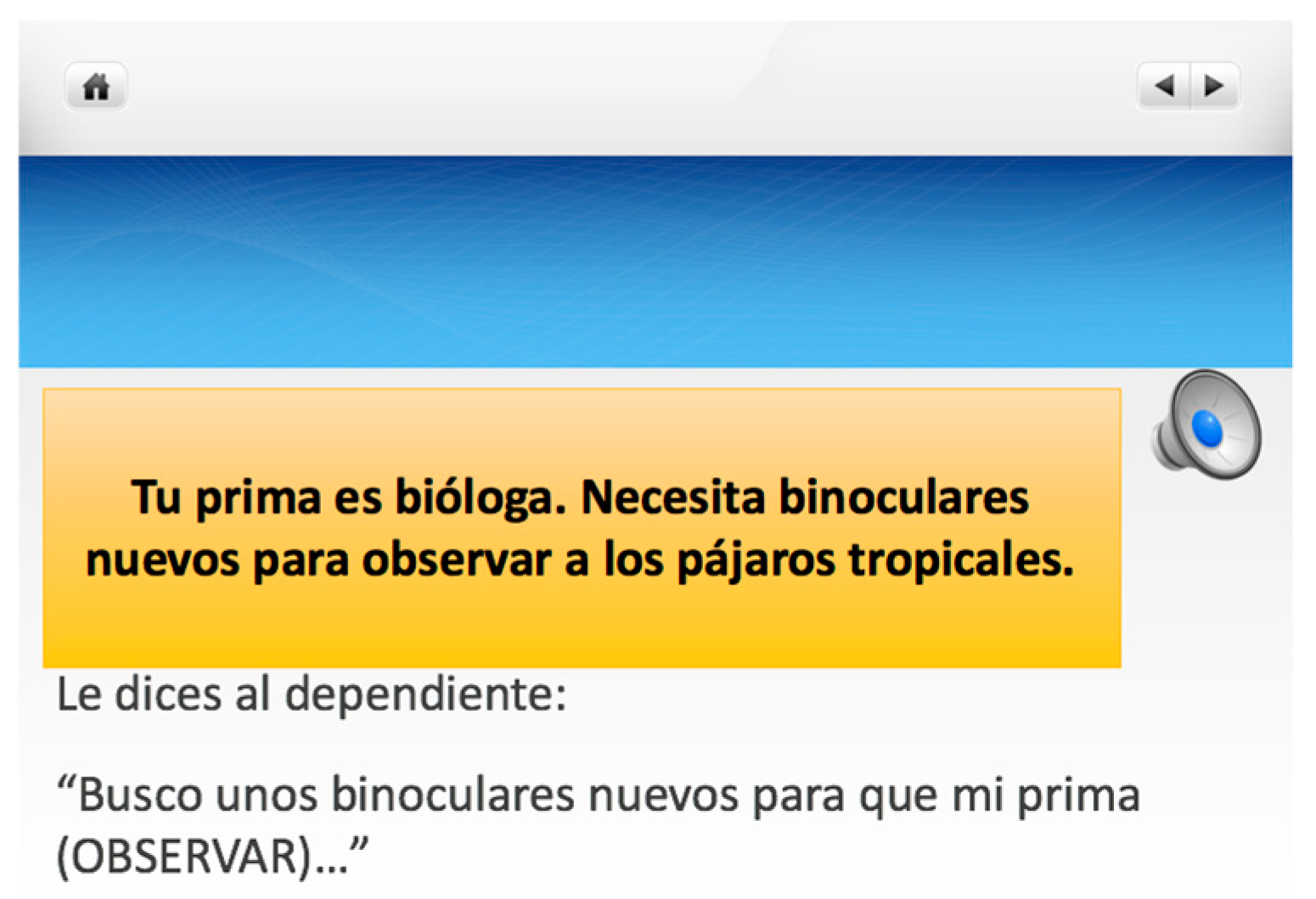
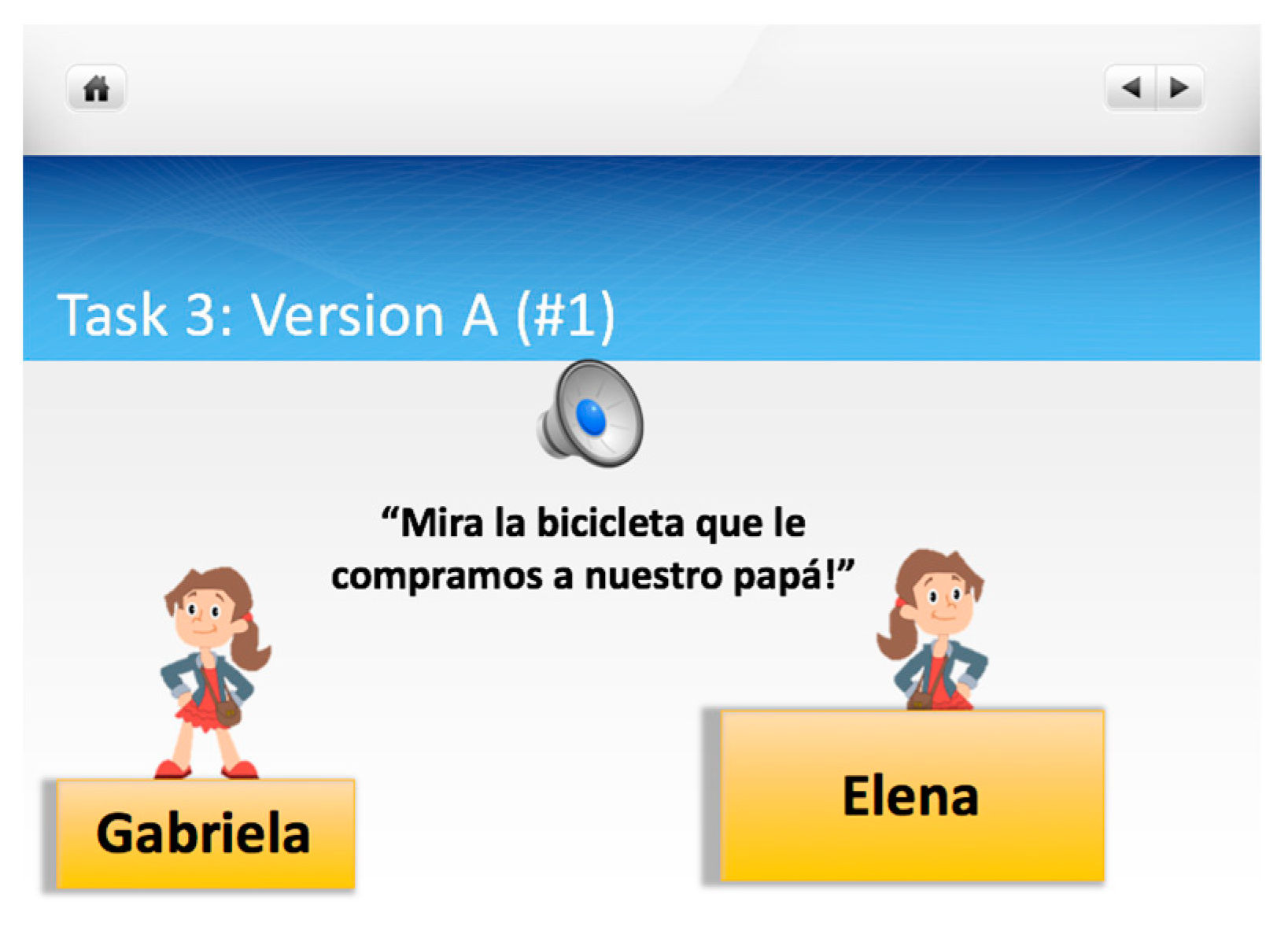
| Verb | MoodSelection | Condition | ExpectedMood | Regularity |
|---|---|---|---|---|
| hacer | Lexical | para que | Subjunctive | Irregular |
| salir | Lexical | para que | Subjunctive | Irregular |
| correr | Lexical | para que | Subjunctive | Regular |
| parecer | Lexical | para que | Subjunctive | Irregular |
| mover | Lexical | para que | Subjunctive | Regular |
| romper | Lexical | para que | Subjunctive | Regular |
| llegar | Lexical | para que | Subjunctive | Regular |
| tomar | Lexical | para que | Subjunctive | Regular |
| tocar | Lexical | para que | Subjunctive | Regular |
| ganar | Lexical | para que | Subjunctive | Regular |
| observar | Lexical | para que | Subjunctive | Regular |
| usar | Lexical | para que | Subjunctive | Regular |
| tener | Contextual | −PRE ARC | Subjunctive | Irregular |
| decir | Contextual | −PRE ARC | Subjunctive | Irregular |
| comprender | Contextual | −PRE ARC | Subjunctive | Regular |
| producir | Contextual | −PRE ARC | Subjunctive | Irregular |
| dirigir | Contextual | −PRE ARC | Subjunctive | Regular |
| elegir | Contextual | −PRE ARC | Subjunctive | Regular |
| llamar | Contextual | −PRE ARC | Subjunctive | Regular |
| hablar | Contextual | −PRE ARC | Subjunctive | Regular |
| aceptar | Contextual | −PRE ARC | Subjunctive | Regular |
| explicar | Contextual | −PRE ARC | Subjunctive | Regular |
| bajar | Contextual | −PRE ARC | Subjunctive | Regular |
| evitar | Contextual | −PRE ARC | Subjunctive | Regular |
| ir | Lexical | porque | Indicative | Irregular |
| llevar | Lexical | porque | Indicative | Regular |
| utilizar | Lexical | porque | Indicative | Regular |
| venir | Lexical | porque | Indicative | Irregular |
| leer | Lexical | porque | Indicative | Regular |
| sacar | Lexical | porque | Indicative | Regular |
| seguir | Contextual | +PRE ARC | Indicative | Regular |
| estar | Contextual | +PRE ARC | Indicative | Regular |
| mirar | Contextual | +PRE ARC | Indicative | Regular |
| necesitar | Contextual | +PRE ARC | Indicative | Regular |
| recibir | Contextual | +PRE ARC | Indicative | Regular |
| decidir | Contextual | +PRE ARC | Indicative | Regular |
| Verb | MoodSelection | Condition | ExpectedMood | Regularity |
|---|---|---|---|---|
| hacer | Lexical | para que | Subjunctive | Irregular |
| salir | Lexical | para que | Subjunctive | Irregular |
| correr | Lexical | para que | Subjunctive | Regular |
| tomar | Lexical | para que | Subjunctive | Regular |
| tocar | Lexical | para que | Subjunctive | Regular |
| tener | Contextual | −PRE ARC | Subjunctive | Irregular |
| decir | Contextual | −PRE ARC | Subjunctive | Irregular |
| comprender | Contextual | −PRE ARC | Subjunctive | Regular |
| hablar | Contextual | −PRE ARC | Subjunctive | Regular |
| aceptar | Contextual | −PRE ARC | Subjunctive | Regular |
| ir | Lexical | porque | Indicative | Irregular |
| mirar | Lexical | porque | Indicative | Regular |
| utilizar | Lexical | porque | Indicative | Regular |
| necesitar | Lexical | porque | Indicative | Regular |
| seguir | Lexical | porque | Indicative | Regular |
| llevar | Contextual | +PRE ARC | Indicative | Regular |
| leer | Contextual | +PRE ARC | Indicative | Regular |
| venir | Contextual | +PRE ARC | Indicative | Irregular |
| estar | Contextual | +PRE ARC | Indicative | Regular |
| recibir | Contextual | +PRE ARC | Indicative | Regular |
Appendix B
| Model Term | Coefficient | Standard Error | t | Sig. |
| Intercept | −2.128 | 0.519 | −4.102 | 0.000 |
| AofAGroup = 1 | 0.101 | 0.683 | 0.148 | 0.883 |
| AofAGroup = 2 | −0.295 | 0.666 | −0.443 | 0.658 |
| AofAGroup = 3 | 1.710 | 0.653 | 2.619 | 0.010 |
| AofAGroup = 4 | ||||
| MoodSelectType = 1 | −2.594 | 0.798 | −3.250 | 0.001 |
| MoodSelectType = 2 | ||||
| ExpectedMood = 1 | 6.889 | 0.758 | 9.085 | 0.000 |
| ExpectedMood = 2 | ||||
| AofAGroup = 1 x MoodSelectType = 1 | −0.174 | 1.059 | −0.165 | 0.869 |
| AofAGroup = 1 x MoodSelectType = 2 | ||||
| AofAGroup = 2 x MoodSelectType = 1 | 0.098 | 1.121 | 0.087 | 0.931 |
| AofAGroup = 2 x MoodSelectType = 2 | ||||
| AofAGroup = 3 x MoodSelectType = 1 | −2.308 | 1.327 | −1.739 | 0.082 |
| AofAGroup = 3 x MoodSelectType = 2 | ||||
| AofAGroup = 4 x MoodSelectType = 1 | ||||
| AoAGroup = 4 x MoodSelectType = 2 | ||||
| MoodSelectType = 1 x ExpectedMood = 1 | 3.112 | 1.254 | 2.481 | 0.013 |
| MoodSelectType = 1 x ExpectedMood = 2 | ||||
| MoodSelectType = 2 x ExpectedMood = 1 | ||||
| MoodSelectType = 2 x ExpectedMood = 2 | ||||
| AofAGroup = 1 x ExpectedMood = 1 | −5.283 | 0.789 | −6.693 | 0.000 |
| AofAGroup = 1 x ExpectedMood = 2 | ||||
| AofAGroup = 2 x ExpectedMood = 1 | −3.894 | 0.788 | −4.942 | 0.000 |
| AofAGroup = 2 x ExpectedMood = 2 | ||||
| AofAGroup = 3 x ExpectedMood = 1 | −1.001 | 1.098 | −0.912 | 0.362 |
| AofAGroup = 3 x ExpectedMood = 2 | ||||
| AofAGroup = 4 x ExpectedMood = 1 | ||||
| AofAGroup = 4 x ExpectedMood = 2 | ||||
| AofAGroup = 1 x MoodSelectType = 1 x ExpectedMood = 1 | 0.597 | 1.433 | 0.417 | 0.677 |
| AofAGroup = 1 x MoodSelectType = 1 x ExpectedMood = 2 | ||||
| AofAGroup = 1 MoodSelectType = 2 ExpectedMood = 1 | ||||
| AofAGroup = 1 x MoodSelectType = 2 x ExpectedMood = 2 | ||||
| AofAGroup = 2 x MoodSelectType = 1 x ExpectedMood = 1 | 0.375 | 1.474 | 0.254 | 0.799 |
| AofAGroup = 2 x MoodSelectType = 1 x ExpectedMood = 2 | ||||
| AofAGroup = 2 x MoodSelectType = 2 x ExpectedMood = 1 | ||||
| AofAGroup = 2 x MoodSelectType = 2 x ExpectedMood = 2 | ||||
| AofAGroup = 3 x MoodSelectType = 1 x ExpectedMood = 1 | 2.610 | 2.038 | 1.281 | 0.200 |
| AofAGroup = 3 x MoodSelectType = 1 x ExpectedMood = 2 | ||||
| AofAGroup = 3 x MoodSelectType = 2 x ExpectedMood = 1 | ||||
| AofAGroup = 3 x MoodSelectType = 2 x ExpectedMood = 2 | ||||
| AofAGroup = 4 x MoodSelectType = 1 x ExpectedMood = 1 | ||||
| AofAGroup = 4 x MoodSelectType = 1 x ExpectedMood = 2 | ||||
| AofAGroup = 4 x MoodSelectType = 2 x ExpectedMood = 1 | ||||
| AofAGroup = 4 x MoodSelectType = 2 x ExpectedMood = 2 | ||||
| ||||
| Model Term | Coefficient | Standard Error | t | Sig. |
| Intercept | −2.406 | 0.588 | −4.094 | 0.000 |
| Group = 1 | 0.389 | 0.713 | 0.546 | 0.587 |
| Group = 2 | ||||
| MoodSelectType = 1 | −1.807 | 0.692 | −2.613 | 0.009 |
| MoodSelectType = 2 | ||||
| ExpectedMood = 1 | 1.462 | 0.489 | 2.989 | 0.004 |
| ExpectedMood = 2 | ||||
| Group = 1 x MoodSelectType = 1 | −1.404 | 1.047 | −1.341 | 0.180 |
| Group = 1 x MoodSelectType = 2 | ||||
| Group = 2 x MoodSelectType = 1 | ||||
| Group = 2 x MoodSelectType = 2 | ||||
| MoodSelectType = 1 x ExpectedMood = 1 | 2.891 | 0.800 | 3.616 | 0.000 |
| MoodSelectType = 1 x ExpectedMood = 2 | ||||
| MoodSelectType = 2 x ExpectedMood = 1 | ||||
| MoodSelectType = 2 x ExpectedMood = 2 | ||||
| Group = 1 x ExpectedMood = 1 | 1.569 | 0.511 | 3.067 | 0.002 |
| Group = 1 x ExpectedMood = 2 | ||||
| Group = 2 x ExpectedMood = 1 | ||||
| Group = 2 x ExpectedMood = 2 | ||||
| Group = 1 x MoodSelectType = 1 x ExpectedMood = 1 | 1.222 | 1.113 | 1.098 | 0.272 |
| Group = 1 x MoodSelectType = 1 x ExpectedMood = 2 | ||||
| Group = 1 MoodSelectType = 2 ExpectedMood = 1 | ||||
| Group = 1 x MoodSelectType = 2 x ExpectedMood = 2 | ||||
| Group = 2 x MoodSelectType = 1 x ExpectedMood = 1 | ||||
| AofAGroup = 2 x MoodSelectType = 1 x ExpectedMood = 2 | ||||
| AofAGroup = 2 x MoodSelectType = 2 x ExpectedMood = 1 | ||||
| AofAGroup = 2 x MoodSelectType = 2 x ExpectedMood = 2 | ||||
| ||||
| Model Term | Coefficient | Standard Error | t | Sig. |
| Intercept | −3.119 | 0.599 | −5.206 | 0.000 |
| AofAGroup = 1 | 1.669 | 0.556 | 3.000 | 0.003 |
| AofAGroup = 2 | 1.391 | 0.554 | 2.510 | 0.012 |
| AofAGroup = 3 | 0.626 | 0.612 | 1.024 | 0.306 |
| AofAGroup = 4 | ||||
| MoodSelectType = 1 | −.174 | 0.846 | −0.206 | 0.838 |
| MoodSelectType = 2 | ||||
| ExpectedMood = 1 | 5.646 | 0.787 | 7.172 | 0.000 |
| ExpectedMood = 2 | ||||
| AofAGroup = 1 x MoodSelectType = 1 | −0.378 | 0.780 | −0.484 | 0.628 |
| AofAGroup = 1 x MoodSelectType = 2 | ||||
| AofAGroup = 2 x MoodSelectType = 1 | −0.741 | 0.797 | −0.929 | 0.353 |
| AofAGroup = 2 x MoodSelectType = 2 | ||||
| AofAGroup = 3 x MoodSelectType = 1 | −0.313 | 0.871 | −0.359 | 0.720 |
| AofAGroup = 3 x MoodSelectType = 2 | ||||
| AofAGroup = 4 x MoodSelectType = 1 | ||||
| AoAGroup = 4 x MoodSelectType = 2 | ||||
| MoodSelectType = 1 x ExpectedMood = 1 | 1.673 | 1.279 | 1.308 | 0.194 |
| MoodSelectType = 1 x ExpectedMood = 2 | ||||
| MoodSelectType = 2 x ExpectedMood = 1 | ||||
| MoodSelectType = 2 x ExpectedMood = 2 | ||||
| AofAGroup = 1 x ExpectedMood = 1 | −3.978 | 0.694 | −5.735 | 0.000 |
| AofAGroup = 1 x ExpectedMood = 2 | ||||
| AofAGroup = 2 x ExpectedMood = 1 | −3.713 | 0.687 | −5.403 | 0.000 |
| AofAGroup = 2 x ExpectedMood = 2 | ||||
| AofAGroup = 3 x ExpectedMood = 1 | −0.590 | 0.807 | −0.731 | 0.465 |
| AofAGroup = 3 x ExpectedMood = 2 | ||||
| AofAGroup = 4 x ExpectedMood = 1 | ||||
| AofAGroup = 4 x ExpectedMood = 2 | ||||
| AofAGroup = 1 x MoodSelectType = 1 x ExpectedMood = 1 | 0.067 | 1.179 | 0.057 | 0.955 |
| AofAGroup = 1 x MoodSelectType = 1 x ExpectedMood = 2 | ||||
| AofAGroup = 1 MoodSelectType = 2 ExpectedMood = 1 | ||||
| AofAGroup = 1 x MoodSelectType = 2 x ExpectedMood = 2 | ||||
| AofAGroup = 2 x MoodSelectType = 1 x ExpectedMood = 1 | 1.606 | 1.213 | 1.324 | 0.186 |
| AofAGroup = 2 x MoodSelectType = 1 x ExpectedMood = 2 | ||||
| AofAGroup = 2 x MoodSelectType = 2 x ExpectedMood = 1 | ||||
| AofAGroup = 2 x MoodSelectType = 2 x ExpectedMood = 2 | ||||
| AofAGroup = 3 x MoodSelectType = 1 x ExpectedMood = 1 | 0.174 | 1.443 | 0.121 | 0.904 |
| AofAGroup = 3 x MoodSelectType = 1 x ExpectedMood = 2 | ||||
| AofAGroup = 3 x MoodSelectType = 2 x ExpectedMood = 1 | ||||
| AofAGroup = 3 x MoodSelectType = 2 x ExpectedMood = 2 | ||||
| AofAGroup = 4 x MoodSelectType = 1 x ExpectedMood = 1 | ||||
| AofAGroup = 4 x MoodSelectType = 1 x ExpectedMood = 2 | ||||
| AofAGroup = 4 x MoodSelectType = 2 x ExpectedMood = 1 | ||||
| AofAGroup = 4 x MoodSelectType = 2 x ExpectedMood = 2 | ||||
| ||||
| Model Term | Coefficient | Standard Error | t | Sig. |
| Intercept | −1.527 | 0.480 | −3.181 | 0.004 |
| Group = 1 | −0.117 | 0.411 | −0.285 | 0.776 |
| Group = 2 | ||||
| MoodSelectType = 1 | −0.408 | 0.684 | −0.596 | 0.557 |
| MoodSelectType = 2 | ||||
| ExpectedMood = 1 | 1.184 | 0.639 | 1.851 | 0.080 |
| ExpectedMood = 2 | ||||
| Group = 1 x MoodSelectType = 1 | −0.416 | 0.611 | −0.681 | 0.496 |
| Group = 1 x MoodSelectType = 2 | ||||
| Group = 2 x MoodSelectType = 1 | ||||
| Group = 2 x MoodSelectType = 2 | ||||
| MoodSelectType = 1 x ExpectedMood = 1 | 2.165 | 0.934 | 2.318 | 0.031 |
| MoodSelectType = 1 x ExpectedMood = 2 | ||||
| MoodSelectType = 2 x ExpectedMood = 1 | ||||
| MoodSelectType = 2 x ExpectedMood = 2 | ||||
| Group = 1 x ExpectedMood = 1 | 1.109 | 0.503 | 2.203 | 0.028 |
| Group = 1 x ExpectedMood = 2 | ||||
| Group = 2 x ExpectedMood = 1 | ||||
| Group = 2 x ExpectedMood = 2 | ||||
| Group = 1 x MoodSelectType = 1 x ExpectedMood = 1 | 0.508 | 0.825 | 0.616 | 0.538 |
| Group = 1 x MoodSelectType = 1 x ExpectedMood = 2 | ||||
| Group = 1 MoodSelectType = 2 ExpectedMood = 1 | ||||
| Group = 1 x MoodSelectType = 2 x ExpectedMood = 2 | ||||
| Group = 2 x MoodSelectType = 1 x ExpectedMood = 1 | ||||
| AofAGroup = 2 x MoodSelectType = 1 x ExpectedMood = 2 | ||||
| AofAGroup = 2 x MoodSelectType = 2 x ExpectedMood = 1 | ||||
| AofAGroup = 2 x MoodSelectType = 2 x ExpectedMood = 2 | ||||
| ||||
References
- Alba, Richard, John Logan, Amy Lutz, and Brian Stults. 2002. Only English by the third generation? Loss and preservation of the mother tongue among the grandchildren of contemporary immigrants. Demography 39: 467–84. [Google Scholar] [CrossRef] [PubMed]
- Anderson, Raquel. 2001. Lexical morphology and verb use in child first language loss: A preliminary case study investigation. International Journal of Bilingualism 5: 377–401. [Google Scholar] [CrossRef]
- Benmamoun, Elabbas, Silvina Montrul, and Maria Polinsky. 2013. Heritage languages and their speakers: Opportunities and challenges for linguistics. Theoretical Linguistics 39: 129–81. [Google Scholar] [CrossRef]
- Borgonovo, Claude, Joyce Bruhn de Garavito, and Philippe Prévost. 2015. Mood selection in relative clauses: Interfaces and variability. Studies in Second Language Acquisition 37: 33–69. [Google Scholar] [CrossRef]
- Bosque, Ignacio. 2012. Mood: Indicative vs. subjunctive. In The Handbook of Hispanic Linguistics. Edited by José Ignacio Hualde, Antxon Olarrea and Erin O’Rourke. Malden: Blackwell Publishing, pp. 371–94. [Google Scholar]
- Bylund, Emanuel. 2009a. Effects of age of L2 acquisition on L1 event conceptualization patterns. Bilingualism: Language and Cognition 12: 305–22. [Google Scholar] [CrossRef]
- Bylund, Emanuel. 2009b. Maturational constraints and first language attrition. Language Learning 59: 687–715. [Google Scholar] [CrossRef]
- Correa, Maite. 2011. Heritage language learners of Spanish: What role does metalinguistic knowledge play in their acquisition of the subjunctive? In Selected Proceedings of the 13th Hispanic Linguistics Symposium. Edited by Luis Ortiz-López. Somerville: Cascadilla Proceedings Project, pp. 128–38. [Google Scholar]
- Durlak, Joseph. 2009. How to select, calculate and interpret effect sizes. Journal of Pediatric Psychology 34: 917–28. [Google Scholar] [CrossRef]
- Fishman, Joshua. 2001. 300-plus years of heritage language education in the United States. In Heritage Languages in America: Preserving a Natural Resource. Edited by Joy Peyton, Donald Ranard and Scott McGinnis. McHenry: Center for Applied Linguistics and Delta Systems. [Google Scholar]
- Giancaspro, David. 2017. Heritage speakers’ production and comprehension of lexically- and contextually-selected subjunctive mood morphology. Ph.D. Thesis, Rutgers University, New Brunswick, NJ, USA. [Google Scholar]
- Giancaspro, David. 2019. Over, under, and around: Spanish heritage speakers’ production (and avoidance) of subjunctive mood. Heritage Language Journal 16: 44–70. [Google Scholar]
- Giancaspro, David. Forthcoming. Not in the mood: Frequency effects in heritage speakers’ subjunctive knowledge. In Lost in Transmission: The role of Attrition and Input in Heritage Language Development. Edited by Bernhard Brehmer, Jeanine Treffers-Daller and Danny Berndt. Amsterdam: John Benjamins.
- Jia, Gisela, and Doris Aaronson. 2003. A longitudinal study of Chinese children and adolescents learning English in the United States. Applied Psycholinguistics 24: 131–61. [Google Scholar] [CrossRef]
- Kupisch, Tanja, and Jason Rothman. 2018. Terminology matters! Why difference is not incompleteness and how early child bilinguals are heritage speakers. International Journal of Bilingualism 22: 564–82. [Google Scholar] [CrossRef]
- Kupisch, Tanja, and Joost van de Weijer. 2016. The role of the childhood environment for language dominance: A study of adult simultaneous bilingual speakers of German and French. In Language Dominance in Bilinguals. Edited by Carmen Silva-Corvalán and Jeanine Treffers-Daller. Cambridge: Cambridge University Press, pp. 174–94. [Google Scholar]
- Lee, Teresa. 2011. Grammatical knowledge of Korean heritage speakers: Early vs. late bilinguals. Linguistic Approaches to Bilingualism 1: 149–74. [Google Scholar] [CrossRef]
- Merino, Barbara. 1983. Language loss in bilingual Chicano children. Journal of Developmental Psychology 4: 277–94. [Google Scholar] [CrossRef]
- Mikulski, Ariana. 2006. Native Intuitions, Foreign Struggles? Knowledge of the Subjunctive in Volitional Constructions among Heritage and Traditional FL Learners of Spanish. Ph.D. Thesis, University of Iowa, Iowa City, IA, USA. [Google Scholar]
- Montrul, Silvina, and Noelia Sánchez-Walker. 2013. Differential object marking in child and adult Spanish heritage speakers. Language Acquisition 20: 109–32. [Google Scholar] [CrossRef]
- Montrul, Silvina, and Silvina Perpiñán. 2011. Assessing differences and similarities between instructed heritage language learners and L2 learners in their knowledge of tense-aspect and mood (TAM) morphology. Heritage Language Journal 8: 90–133. [Google Scholar]
- Montrul, Silvina, and Kim Potowski. 2007. Command of gender agreement in school-age Spanish-English bilingual children. International Journal of Bilingualism 11: 301–28. [Google Scholar] [CrossRef]
- Montrul, Silvina. 2002. Incomplete acquisition and attrition of Spanish tense/aspect distinctions in adult bilinguals. Bilingualism: Language and Cognition 5: 39–68. [Google Scholar] [CrossRef]
- Montrul, Silvina. 2004. The Acquisition of Spanish. Amsterdam: John Benjamins. [Google Scholar]
- Montrul, Silvina. 2009. Knowledge of tense-aspect and mood in Spanish heritage speakers. International Journal of Bilingualism 13: 239–69. [Google Scholar] [CrossRef]
- Montrul, Silvina. 2011. First language retention and attrition in an adult Guatemalan adoptee. In First Language Attrition. Edited by Monika Schmid and Barbara Köpke. Amsterdam: John Benjamins, pp. 276–311. [Google Scholar]
- Montrul, Silvina. 2016. The Acquisition of Heritage Languages. Cambridge: Cambridge University Press. [Google Scholar]
- Otheguy, Ricardo, and Ana Celia Zentella. 2012. Spanish in New York: Language Contact, Dialect Leveling, and Structural Continuity. New York: Oxford University Press. [Google Scholar]
- Pascual y Cabo, Diego, and Inmaculada Gómez-Soler. 2015. Preposition stranding in Spanish as a heritage language. Heritage Language Journal 12: 186–209. [Google Scholar]
- Pascual y Cabo, Diego, and Jason Rothman. 2012. The (il)logical problem of heritage speaker bilingualism and incomplete acquisition. Applied Linguistics 33: 450–55. [Google Scholar] [CrossRef]
- Perez-Cortes, Silvia. 2016. Acquiring obligatory and variable mood selection: Spanish heritage speakers and L2 learners’ performance in desideratives and reported speech contexts. Ph.D. Thesis, Rutgers University, New Brunswick, NJ, USA. [Google Scholar]
- Pérez-Leroux, Ana Teresa. 1998. The acquisition of mood selection in Spanish relative clauses. The Journal of Child Language 25: 585–604. [Google Scholar] [CrossRef]
- Pires, Acrisio, and Jason Rothman. 2009. Disentangling sources of incomplete acquisition: An explanation for competence divergence across heritage grammars. International Journal of Bilingualism 13: 211–38. [Google Scholar] [CrossRef]
- Portes, Alejandro, and Rubén Rumbaut. 2014. Immigrant America: A Portrait. Oakland: University of California Press, pp. 214–57. [Google Scholar]
- Putnam, Michael, and Liliana Sánchez. 2013. What’s so incomplete about incomplete acquisition? A prolegomenon to modeling heritage language grammars. Linguistic Approaches to Bilingualism 3: 476–506. [Google Scholar] [CrossRef]
- Rodriguez, Estrella, Kristina Bustamante, Carla Wood, and Gretchen Sunderman. 2017. A comparison of grammatical production of child heritage speakers of Spanish across language and grade: Kindergarten and grade 1. Languages 2: 27. [Google Scholar] [CrossRef]
- Schmid, Monika. 2012. The impact of age and exposure on bilingual development in international adoptees and family migrants: A perspective from Holocaust survivors. Linguistic Approaches to Bilingualism 2: 177–208. [Google Scholar] [CrossRef][Green Version]
- Sherkina-Lieber, Marina. 2015. Tense, aspect and agreement in heritage Labrador Inuttitut: Do receptive bilinguals understand functional morphology? Linguistic Approaches to Bilingualism 5: 30–61. [Google Scholar] [CrossRef]
- Silva-Corvalán, Carmen. 1994. Language Contact and Change: Spanish in Los Angeles. New York: Oxford University Press. [Google Scholar]
- Silva-Corvalán, Carmen. 2014. Bilingual Language Acquisition: Spanish and English in the First Six Years. Cambridge: Cambridge University Press. [Google Scholar]
- Torres, Julio, Ricardo Estremera, and Sherez Mohamed. 2019. The contribution of psychosocial and biographical variables to heritage language learners’ linguistic knowledge of Spanish. Studies in Second Language Acquisition. [Google Scholar] [CrossRef]
- Torres, Julio. 2018. The effects of task complexity on heritage and L2 development. Canadian Modern Language Review 74: 128–52. [Google Scholar] [CrossRef]
- Van Osch, Brechje, and Petra Sleeman. 2018. Spanish heritage speakers in the Netherlands: Linguistic patterns in the judgment and production of mood. International Journal of Bilingualism 22: 513–29. [Google Scholar] [CrossRef]
- Viner, Kevin. 2016. Second-generation NYC bilinguals’ use of the Spanish subjunctive in obligatory contexts. Spanish in Context 13: 343–70. [Google Scholar] [CrossRef]
- Viner, Kevin. 2017. Subjunctive use in the speech of New York City Spanish heritage language bilinguals: A variationist analysis. Heritage Language Journal 14: 307–33. [Google Scholar]
- Viner, Kevin. 2018. The optional Spanish subjunctive mood grammar of New York City heritage bilinguals. Lingua 210–211: 79–94. [Google Scholar] [CrossRef]
- Zentella, Ana Celia. 1997. Growing Up Bilingual. Malden: Blackwell Publishing. [Google Scholar]
| 1 | |
| 2 | Four of the LCIs were born in the US but then moved to a Spanish-speaking country during very early childhood, specifically, at the ages of (a) 3 weeks old (Participant 61), (b) 2 months old (Participant 11), (c) 2 years old (Participant 75) and (d) 4 years old (Participant 75). Participant 11 and Participant 75 may have been exposed to some English early in childhood. However, given that both of these participants lived with monolingual, Spanish-speaking parents during these short stints in the US, it is unlikely that they received anything more than minimal English exposure at home. |
| 3 | A reviewer suggests that it would have been better for the sentence fragments in the presuppositional ARC condition, such as (7), to begin with the verb, busco (‘I look for’), as in the -Presupposition items. While doing so would make the items in the presuppositional ARC and non-presuppositional ARC conditions more similar structurally, it is not necessary to have structurally identical items, respectively, in order to show that HSs are sensitive to mood in ARCs. If HSs produce more subjunctive mood in sentences like (6a-b) than in sentences like (7), then it is clear that their production of mood is modulated by the presence or absence of presupposition. |
| 4 | An odds-ratio (OR), as the name suggests, is simply the ratio between two odds. If a group’s probability of producing subjunctive in Condition A is 80 percent—which can be expressed in odds as ‘4’ (80/20 = 4)—and their predicted probability of producing subjunctive in Condition B is 50 percent—which can be expressed in odds as ‘1’ (50/50 = 1)—then the odds ratio between these two conditions is 4 (4/1 = 4). |
| 5 | The variable ExpectedMood simply refers to the mood morphology that is expected in a given context, based on what is known about mood selection in monolingual and first-generation immigrant varieties of Spanish. Because para que, for example, obligatorily selects for subjunctive mood in these varieties, the para que condition is coded as ‘1’: SubjunctiveExpected. |
| 6 | In Section 2.2.1, I presented statistics showing that participants were no more likely to produce subjunctive in the “prime conditions” ((4b) and (6a)) than in the baseline conditions. Despite this finding, it is conceivable that participants, as a result of seeing target subjunctive forms in some experimental sentence fragments, may have produced more subjunctive with para que and in -PRE ARCs than what has been observed in previous studies. A quick comparison with the results of Giancaspro (2019), whose production task did not expose participants to any subjunctive primes, shows that this is not the case. The 12 IntHSs (55.5% with para que and 15.1% in -PRE ARCs) and 17 AdvHSs (88.9% with para que and 66.9% in -PRE ARCs) in Giancaspro (2019) produced very similar rates of subjunctive as compared to the IntHSs (53.5% with para que and 28.0% in -PRE ARCs) and AdvHSs (87.2% with para que and 73.4 in -PRE ARCs) in the present study. |
| 7 | Interestingly, though, HSs’ DELE proficiency scores were not correlated with the number of college Spanish courses that they had taken: EarlyHSs (r = 0.311, p = 0.224), LateHSs (r = 0.307, p = 0.188), IntHSs (r = 0.369, p = 0.160), AdvHSs (r = 0.259, p = 0.256). |
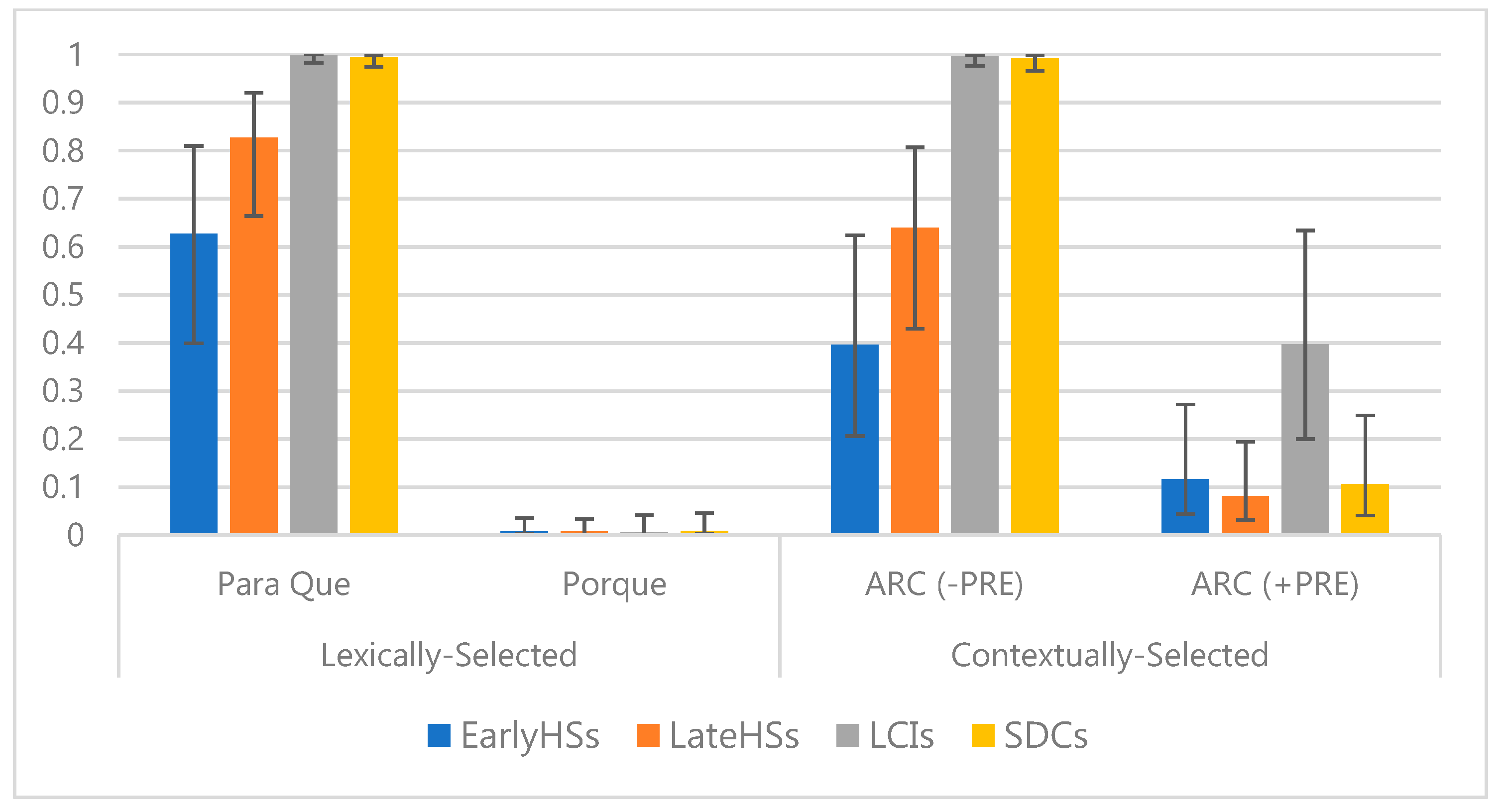
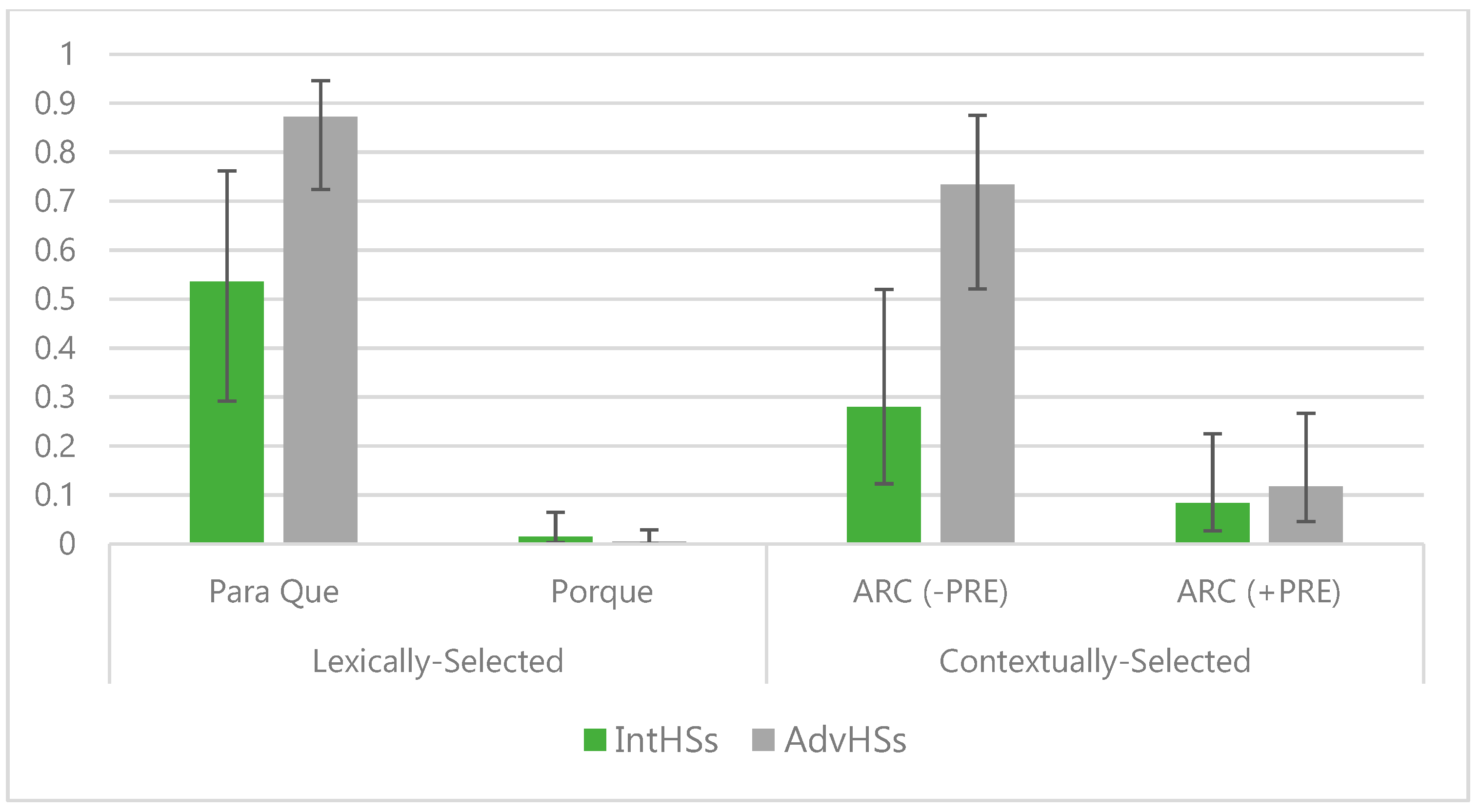
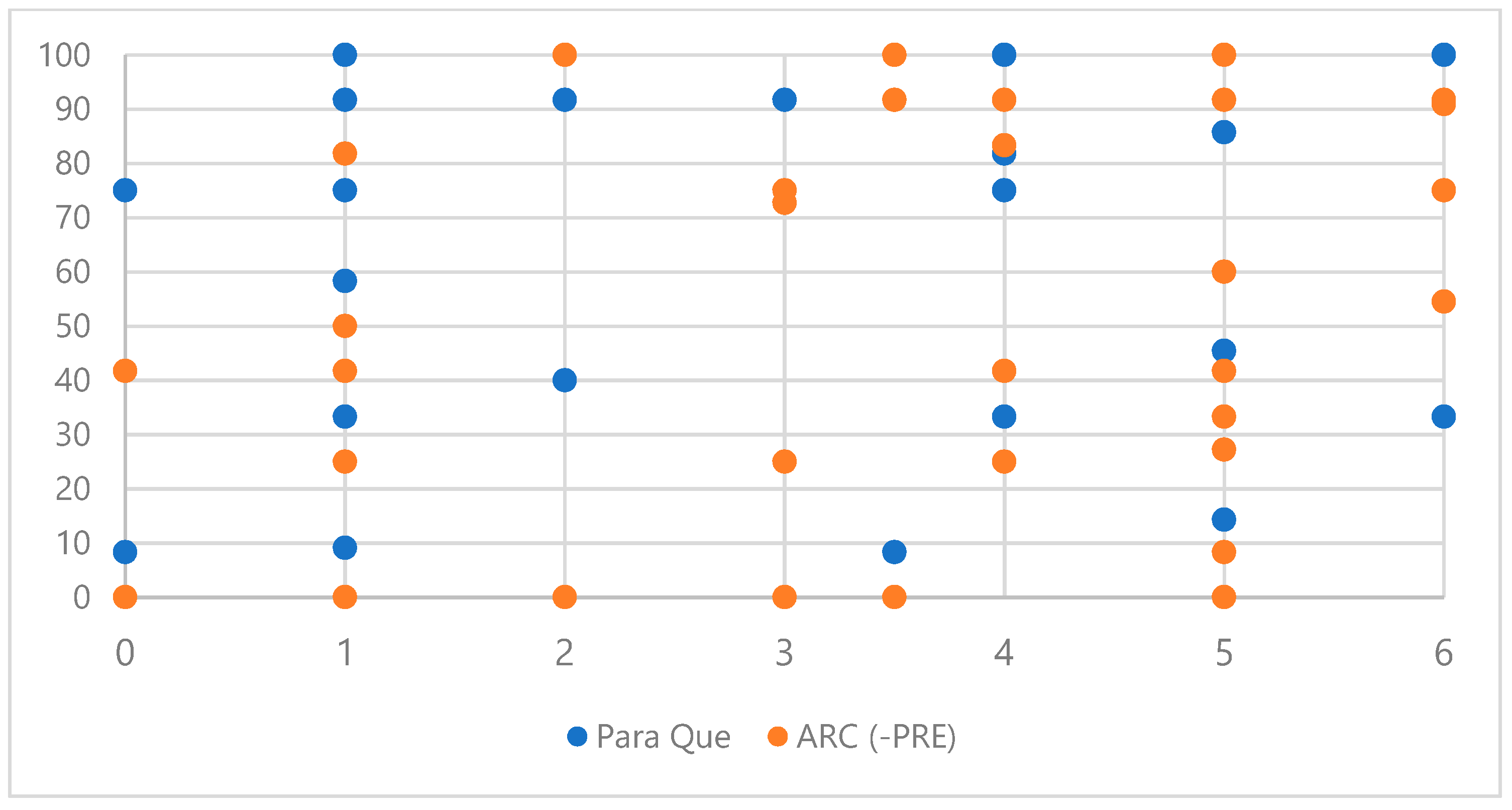
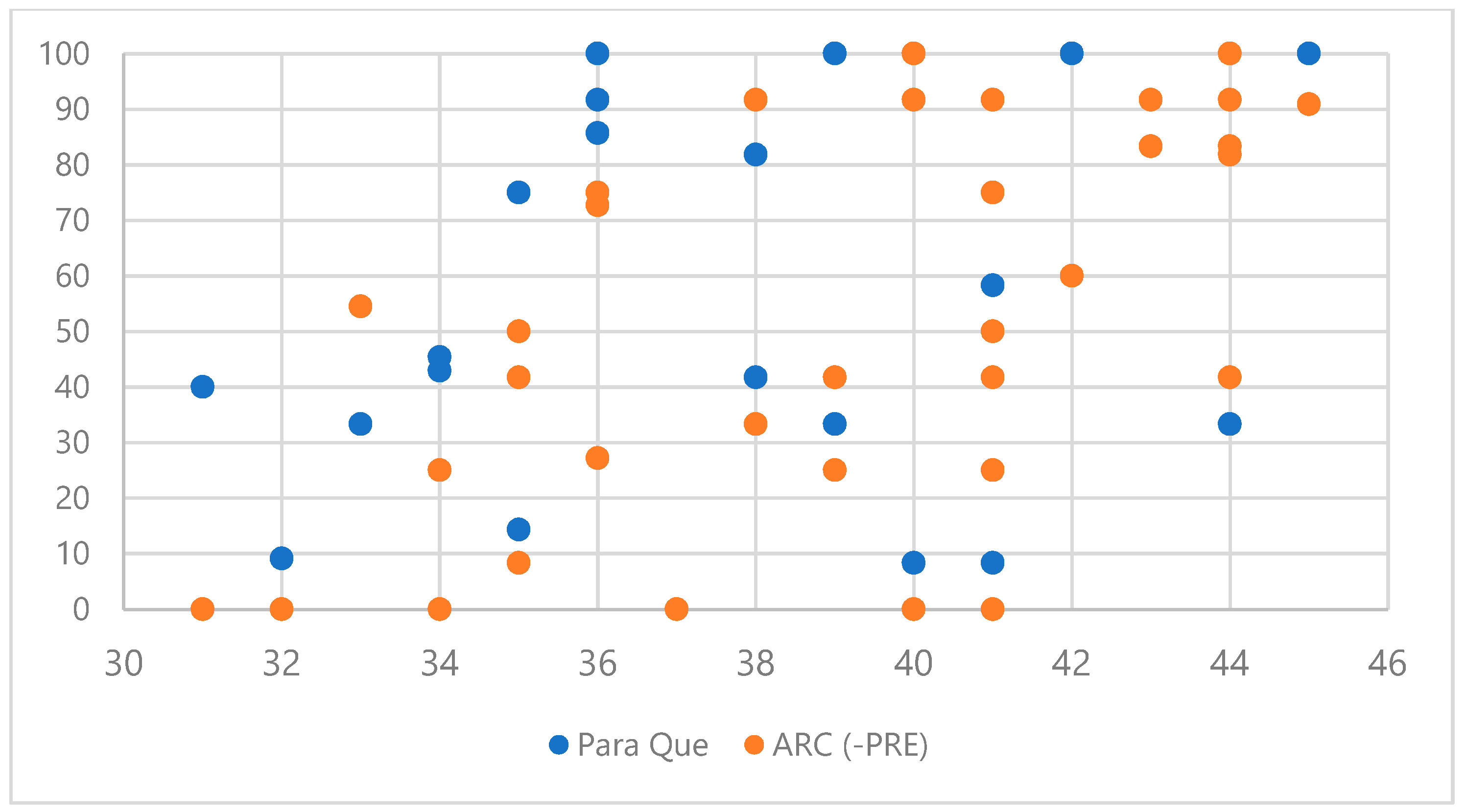

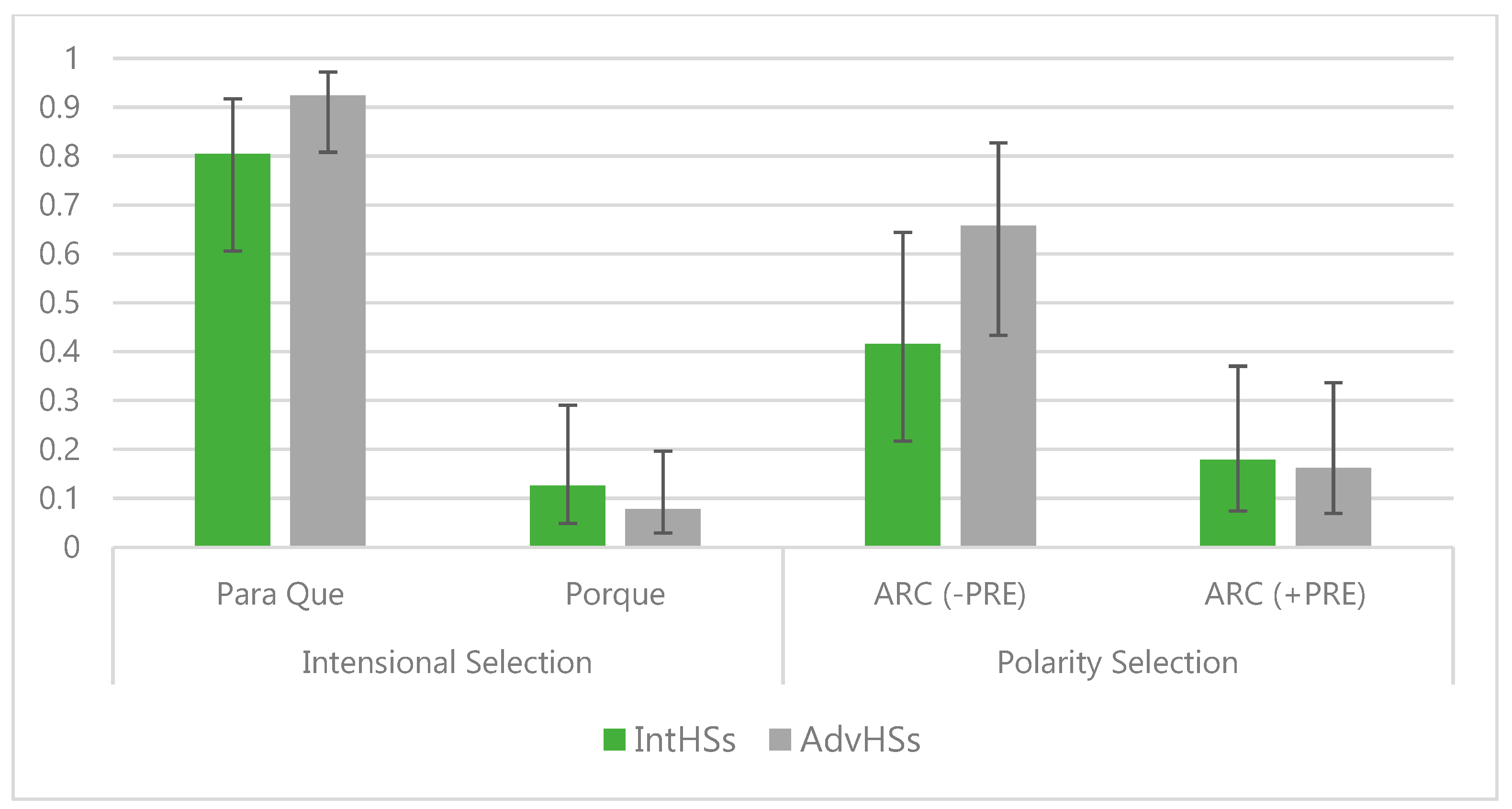
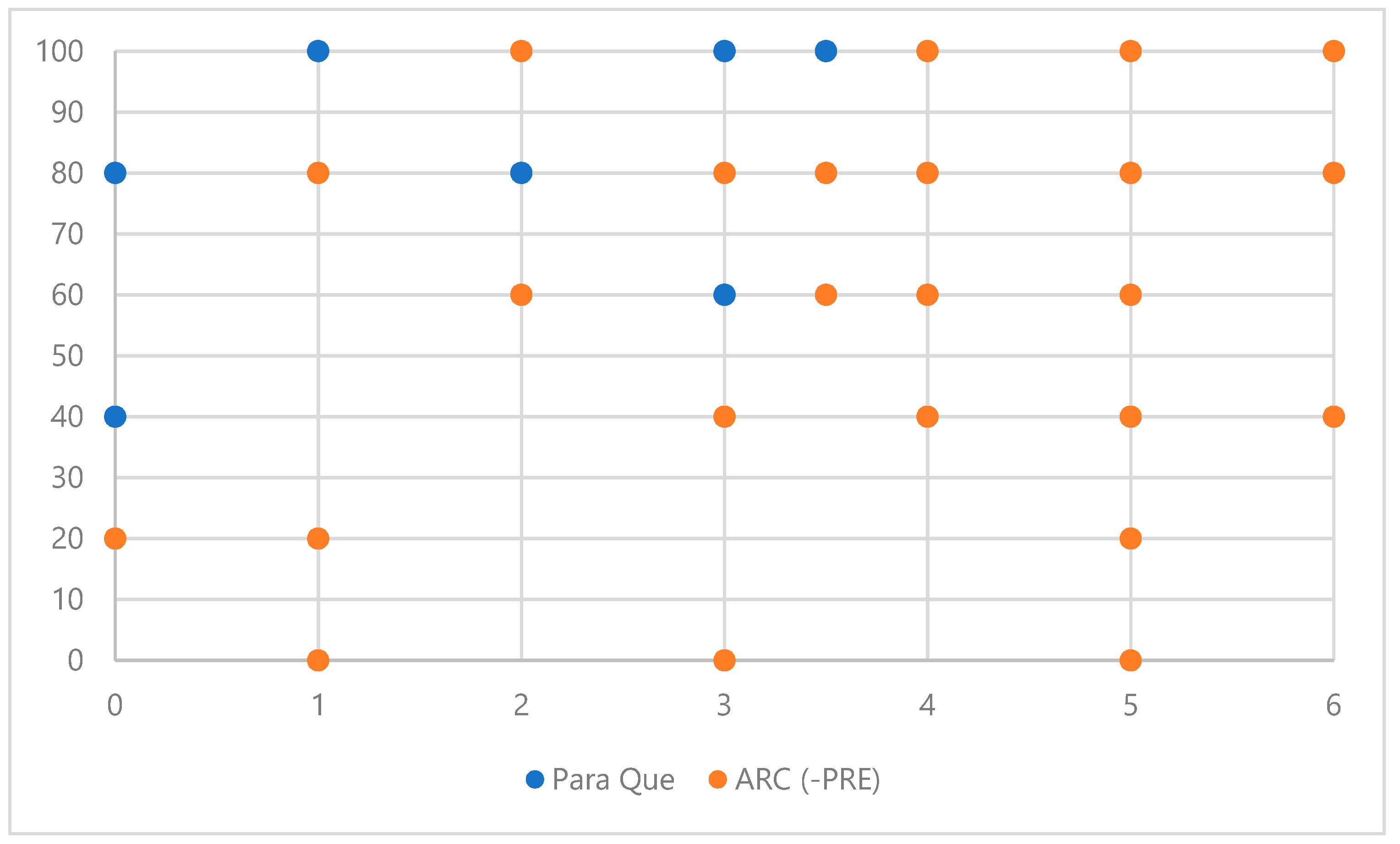
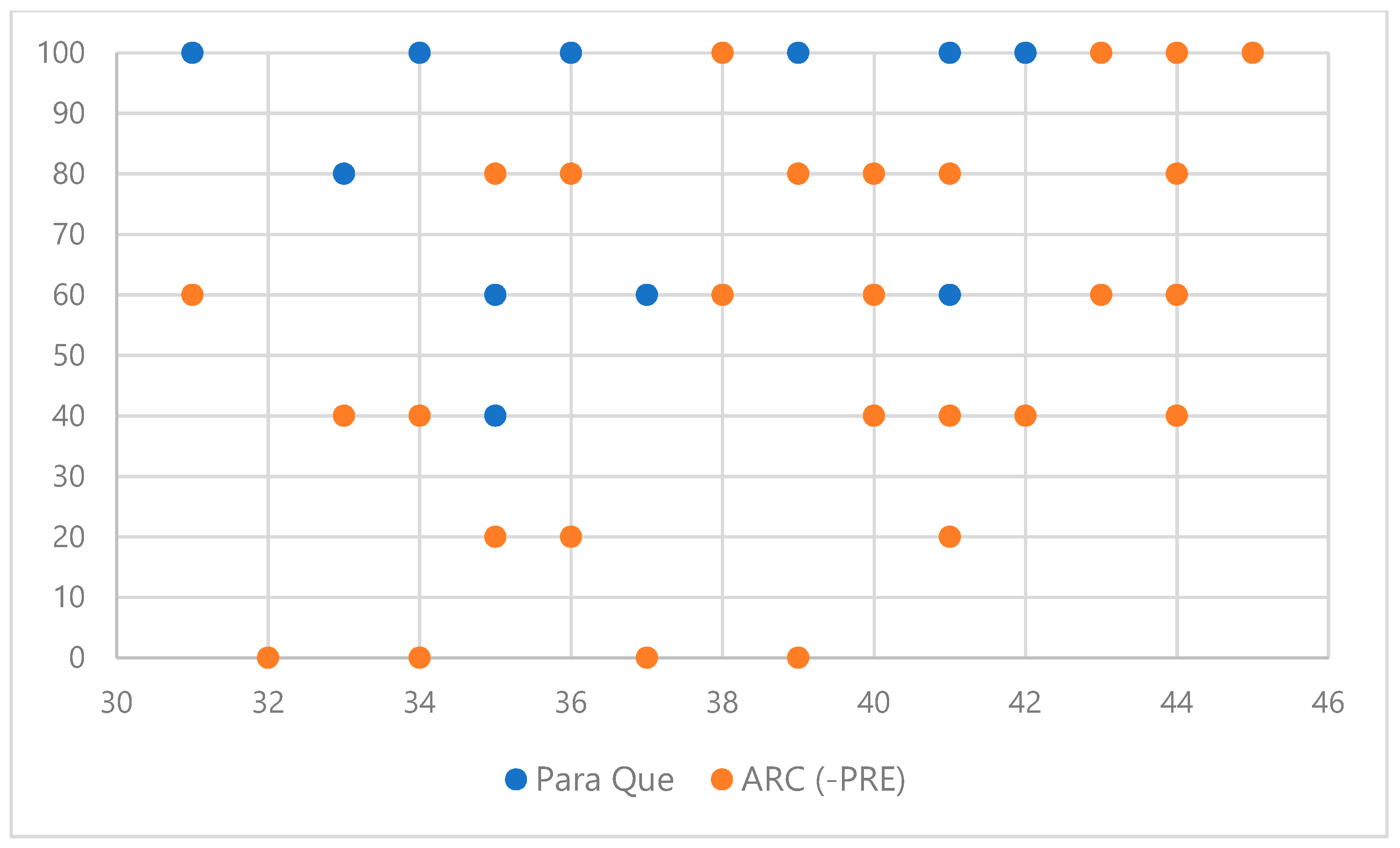
| Condition | MoodSelection | Target Mood | # of Items |
|---|---|---|---|
| para que | Lexical | Subjunctive | 12 |
| porque | Lexical | Indicative | 6 |
| −PRE ARC | Contextual | Subjunctive | 12 |
| +PRE ARC | Contextual | Indicative | 6 |
| Condition | MoodSelection | Target Mood | # of Items |
|---|---|---|---|
| para que | Lexical | Subjunctive | 5 |
| porque | Lexical | Indicative | 5 |
| −PRE ARC | Contextual | Subjunctive | 5 |
| +PRE ARC | Contextual | Indicative | 5 |
© 2019 by the author. Licensee MDPI, Basel, Switzerland. This article is an open access article distributed under the terms and conditions of the Creative Commons Attribution (CC BY) license (http://creativecommons.org/licenses/by/4.0/).
Share and Cite
Giancaspro, D. The Late(r) Bird Gets the Verb? Effects of Age of Acquisition of English on Adult Heritage Speakers’ Knowledge of Subjunctive Mood in Spanish. Languages 2019, 4, 69. https://doi.org/10.3390/languages4030069
Giancaspro D. The Late(r) Bird Gets the Verb? Effects of Age of Acquisition of English on Adult Heritage Speakers’ Knowledge of Subjunctive Mood in Spanish. Languages. 2019; 4(3):69. https://doi.org/10.3390/languages4030069
Chicago/Turabian StyleGiancaspro, David. 2019. "The Late(r) Bird Gets the Verb? Effects of Age of Acquisition of English on Adult Heritage Speakers’ Knowledge of Subjunctive Mood in Spanish" Languages 4, no. 3: 69. https://doi.org/10.3390/languages4030069
APA StyleGiancaspro, D. (2019). The Late(r) Bird Gets the Verb? Effects of Age of Acquisition of English on Adult Heritage Speakers’ Knowledge of Subjunctive Mood in Spanish. Languages, 4(3), 69. https://doi.org/10.3390/languages4030069




